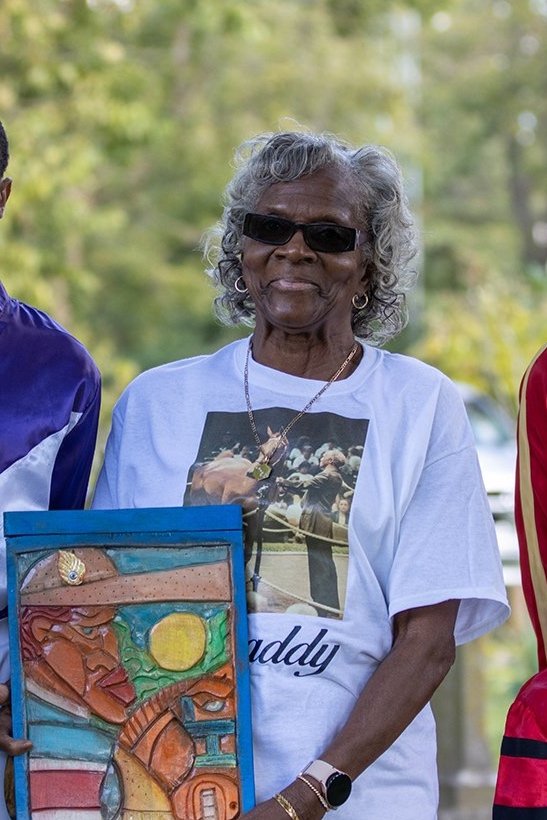Dudley Sidney (1929 - 2003) — Award accepted by daughter Wanda Sidney Green
Mr. Sidney grew up around horses in his native Georgetown, Kentucky. His grandfather owned a livery stable where Sidney spent a lot of time. He worked at Castleton, Walnut Hall and Dodge Stables - the most prestigious breeding and training farms in the area. He worked for twenty-eight years with LFUCG Solid Waste Management before retiring to become a ringman at the age of fifty-two in 1982. He worked with Frank Wilson and Cordell Anderson during a ten-day auction in which they handled 1,000 horses.
Sidney said in a 2001 interview, that he tried to let the horse stand first, let the people look at him, walk him and turn him around and stand him again. Then if somebody’s bidding on him, I’ll try and point him toward that person where they can get a good look at him. I pay attention to the bidding. If it gets over a million dollars, I make sure and stand the horse up real straight because they’re gonna want to take a good picture of him. Sidney, the “Horse Whisperer”, quietly talked to the horses while they stood in the ring.
In October 1998 he held the reins of a Mr. Prospector colt that sold for $2.1 million. Sidney and the colt were featured on the cover of Blood Horse magazine, one of several times his image was captured. Sidney appeared in the 1988 TV movie, Bluegrass. Before his retirement, Keeneland hosted a testimonial dinner in his honor.
Cordell Anderson
Mr. Anderson began working with horses in his teens for Eileen Cliggott, a Jamaican trainer and trail blazer for female conditioners. He was a groom for the filly Distinctive Restless which had been shipped from New York by her owners, Mr. & Mrs. John Munroe. Because the filly and he had bonded, the Munroe’s asked him to accompany her back to the United States for a race. Anderson was unable to get a visa at the time but kept up with the filly’s racing career. When she was retired to Kentucky’s Taylor Made Farm in 1981, Anderson came to the United States to work under farm owner Duncan Taylor’s tutelage. This was in 1982.
Upon recommendation of a veterinarian, Anderson began working as a Keeneland ringman during the November 1988 sales. He says he was nervous that first day but watched how the other guys, Frank Wilson, Dudley Sidney and Ron Hill did it and got the hang of it. One of the horses he handled -Life at the Top- sold for $1.9 million on his first day. In 2014 he handled Runhappy. The next year the Thoroughbred became an Eclipse award winner and winner of several graded races, one of them the Grade 3 Phoenix Stakes sponsored by Stoll, Keenon and Odgen.
John Joe Hughes Jr. (b.1926)
Mr. Hughes, as a young man in the early 1940s, began working in the horse industry. Beginning as a stable hand, he advanced to exerciser, limbering up the horse for afternoon racing. Without that warmup, the horse may have performed badly or even become injured. It is the same as an athlete who doesn’t warm up before a game or tournament.
In the 1960s, he was a groom for trainer, John “Bud” Greely, son of President Greely of Keeneland. Hughes saved the licenses that showed he worked at tracks in Kentucky, California, New York, New Jersey, and Arkansas. He retained a photo of himself holding the reins of Ein Prosit, winner of a race at Delaware Park in 1967.
Mr. Hughes’ work as a groom was important to the health, wellbeing, and performance of each horse with which he worked.
The Louie B. Nunn Center for Oral History, UK, holds his interview of 2019. The International Museum of the Horse holds a profile of his career on the website www.africanamericanhorsestories.org
Francis Carrol Wilson, Sr. (1928 - 2015) — Award accepted by Grandson Jermo Reese
Wilson gained his experience and perfected his skills working with horses of the Jonabell Farm. When owners John and Jessica Bell hired him In 1948, they told him that employment “might be a week or it might be a month.”
Wilson worked in all capacities, but his special touch was with newborn colts and fillies. He helped foal Damascus in 1964. The Thoroughbred became a winner in 1967 of the Preakness Stakes, Belmont Stakes, Jockey Club Gold Cup, Wood Memorial Travers Stakes, Dwyer Handicap and Woodward Stakes and was named Horse of the Year.
Wilson, after forty-five years of foaling, training, grooming and accompanying yearling colts and fillies to sales, retired from the farm in 1993. Bell once said of Wilson “He’s part of our family. Wilson’s kindness and his gentleness makes him so effective. You won’t find any better.”
While still employed at Jonabell, Wilson began as a ringman in Keeneland Sales Pavilion in 1967. Yearlings brought to auction are nervous and unfamiliar with the voices, noise, lights, and other horses. Wilson was said to be ‘the calm in the eye of the storm” as he effectively posed the horses to show their best qualities to potential buyers. He showed the first million-dollar horse sold at auction. Keeneland honored Wilson with a brass plaque that reads “Frankie’s Corner”, an area where he sat waiting for the next horse during the auctions.
The Award was accepted by grandson, Jermo Reese who honored his grandfather by establishing Frankie’s Corner Little Thoroughbred Crusade. The program is an introduction to the equestrian world and horsemanship.




